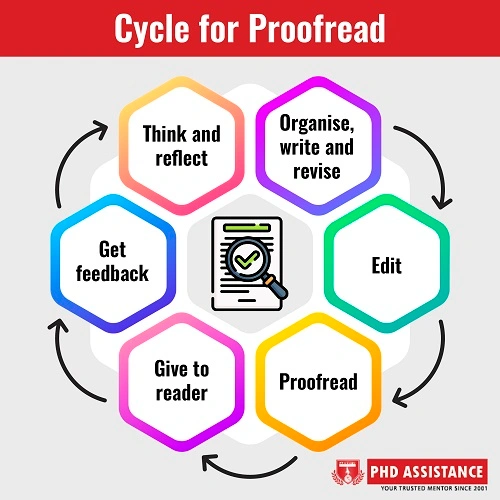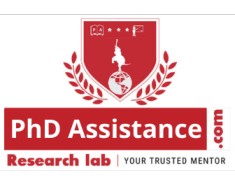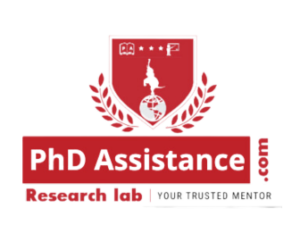How Proof reading and peer review improve PhD thesis quality
Introduction
For most PhD scholars, writing a thesis or dissertation is the first time they are obliged to create a lengthy academic or technical work. The substance of academic papers is usually complex, with a lot of difficult data and other material that has to be presented and explained thoroughly. Every detail must be exact, the content must be well-organized as a whole, references must be precise, thorough, and reliable, and the student’s writing must be clear and free of any grammatical, spelling, and punctuation problems.
There are several considerations to take into consideration when writing a PhD’s thesis, and it is important to proofread each and every page, component, and element with keen eyes, editing and amending as needed to generate a paper that is flawless in every manner (Maphumulo & Bhengu, 2019). Phdassistance supports many scholars for preparing their thesis with the best guidelines.

Figure 1. Cycle for proofread
Source: Monash University (2020)
Proofreading the thesis
Whether it’s an academic article, a job application, an internet blog, or a print brochure, proofreading is required for any material that will be shared with an audience. One may proofread the text manually or hire someone to do it for them, depending on their talents and expense.
Proofreading is a different phase in which the scholars go over a text carefully to confirm that it is technically correct. After they have completed all of their primary content edits, they should proofread the dissertation. To save both time and effort, this is done. Why review a section that will be removed later, after all? If they proofread before finishing the editing work, they may need to go back and proofread new sections that were added or changed while editing. Proofreading the thesis should be done just after they have finished revising for the last time (Harwood, 2019).
Dissertation proofreading always need to be double-checked that the word choice is right, in addition to technical accuracy such as spelling, grammar, punctuation, and formatting. Proofreading the thesis will also allow the scholars to check for readability and grammatical problems one last time. Finally, thesis proofreading will ensure that the word selections, abbreviation usage, and capitalization are accurate throughout the document.
Proofreading a thesis is essential since any errors in a formal document make it appear less trustworthy and professional. This is especially true in academic circles. The scholars will focus on English proofreading in the thesis, but they must always remember that thesis proofreading is important regardless of the language they used to create the masterpiece.
Peer review PhD thesis
Peer review encourages scholars to invest in their writing by assisting them in seeing the connection among their work and their academics in ways that scholars may ignore. It drives scholars to engage in writing and promotes self-reflection, which helps them develop critical thinking skills. Instead of merely responding effectively to a prompt, graduates become persistent learners and authors who learn to challenge their own writing, values, and participation.
Steps involved in peer reviewing the thesis
- Peer review makes the process of writing more collaborative, allowing scholars to understand from one another and consider the function of literature in the course. The assignment’s objectives are now clear. Scholars are forced to focus on goals rather than becoming diverted fully by grammar and pronunciation or by their own nervousness by analyzing whether or not specific student examples fit the standards.
- Reviewing their thesis with an expert scholar can provide them with valuable information about the formatting style they should use. Each university has its own formatting style, which plays an important part in having their thesis accepted. If the scholars make a mistake with the formatting style, the reviewer will point it out to them so that they may correct it (Yu, 2019).
- A reviewer can point out any spelling, grammatical, or vocabulary mistakes the scholars made while writing their thesis. Phdassistance expert helps to peer review their documents with more accuracy.
- Peer review might help them discover any faults they have made in terms of referencing and numbering.
- An expert reviewer will look over the tables the scholars made to record their research findings. They’ll make sure that the numbering, font, and margins are all consistent across all of the tables.
- A reviewer will check to see if their dissertation is within the word restriction. Universities pay close attention to the word count of their thesis, and also will only accept it if it falls inside the word count restriction.
- A reviewer will also check to see if the scholars have put together and written their thesis in an engaging way to intrigue the readers’ interest (Martínez-López et al., 2019).
Conclusion
Some individuals have easier time writing than others. Understanding their current level of writing and identifying what needs to be improved are the keys to improving their own writing. Thus proof reading and peer review helps a lot to improve the quality of PhD thesis. Phdassistance helps the scholars in an easy way to proof read and peer review their thesis. Also they have their experienced team to support PhD graduates in writing their complete thesis in an efficient way.
References
- Harwood, N. (2019). ‘I Have to Hold Myself Back from Getting into All That’: Investigating Ethical Issues Associated with the Proofreading of Student Writing. Journal of Academic Ethics, 17(1), 17–49.
- Maphumulo, W. T., & Bhengu, B. R. (2019). Challenges of quality improvement in the healthcare of South Africa post-apartheid: A critical review. Curationis, 42(1).
- Martínez-López, J. I., Barrón-González, S., & Martínez López, A. (2019). Which Are the Tools Available for Scholars? A Review of Assisting Software for Authors during Peer Reviewing Process. Publications, 7(3), 59.
- Monash University. (2020). Improving your editing skills.
- Yu, S. (2019). Learning from giving peer feedback on postgraduate theses: Voices from Master’s scholars in the Macau EFL context. Assessing Writing, 40, 42–52.



